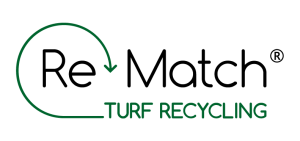A sustainable solution
Stadiums and sports arenas throughout the world are increasingly using synthetic turf, but after about 10 years even the highest quality turf is worn-out. In most cases, disposal of this turf means either incineration or landfilling – both with significant negative environmental impact.
Using Re-Match’s patented process, pitch owners can dispose of their worn-out synthetic turf in a better, cheaper and environmentally safe way.
The Re-Match process is ETV-verified and the Herning factory is both ISO 9001, ISO 14001 and EuCertPlast-certified.
Worn-out turf is separated into clean raw components
The Re-Match process makes it possible to dispose of worn-out synthetic turf without leaving any waste from the original components. The turf is picked up and transported safely to a Re-Match facility where it is separated into clean, raw materials using our advanced separation technology.
The raw material; sand, backing, rubber and plastic fibre, is then sold on and used in new production cycles – and even used for installation of new synthetic turf pitches.
A typical synthetic turf pitch
The average life of a pitch is 10 years, based on normal quality, proper installation, reasonable maintenance, exposure to sunlight and normal usage over its lifetime. It covers 7,000m2 and weighs 220-240 tons, distributed over:
- 60% sand
- 30% rubber granulate
- 5% backing, and
- 5% turf fibres
Bringing it back
It is the vision of Re-Match to ensure full circularity of all the recycled end products from its recycling process.
While the clean and separated sand and rubber granulate can easily go back into new synthetic turf pitches as infill, turning the recycled plastic fibre into yarn, which could be used in the production of new synthetic turf is a more challenging task.
To achieve this, Re-Match has established the Circular Turf Yarn Development Project, co-funded by the Danish government and EU’s Horizon 2020 Research & Innovation program. The development is made in exclusivity with the Fraunhofer Institute in Germany. By applying new chemical techniques, the project has demonstrated that new yarn can be made from recycled plastic fibre and of equivalent quality and strength to virgin turf yarn.
To prove this in real life, a number of pilot fields are being planned – among others in Berlin.





